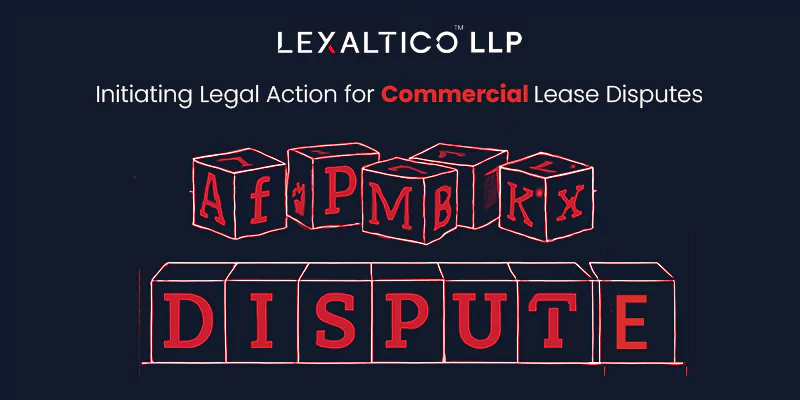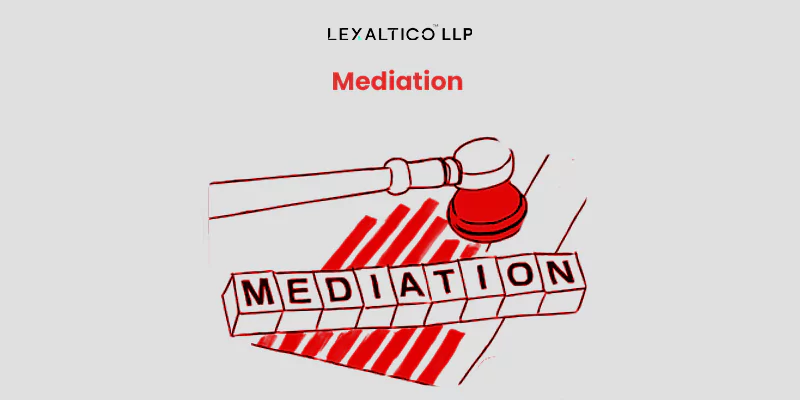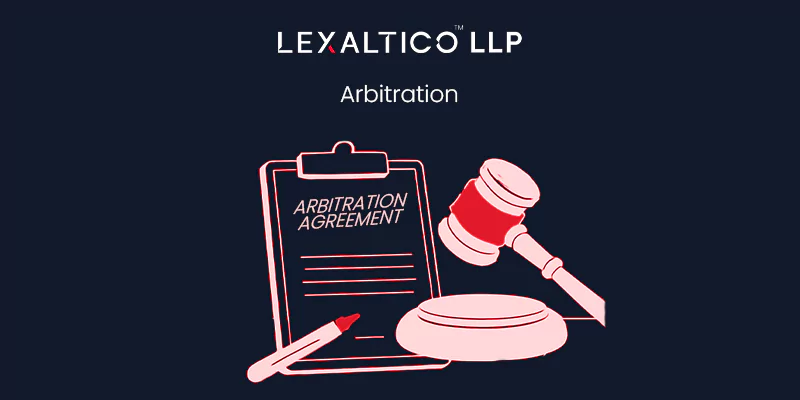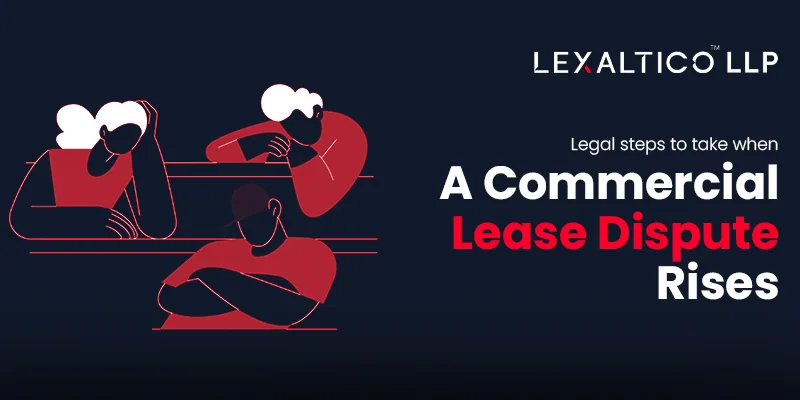Disputes can happen at any time. In business, this often means problems between tenants and landlords. These issues are common in commercial lease agreements. Tenants and landlords may disagree over rent, repairs, lease terms, or renewal rights. Sometimes, disputes can also involve government rules, especially in regulated industries.
In Canada, most decisions by the government can be reviewed by a court. Businesses can also take legal action against the government if they suffer damage due to rules or unfair treatment. Still, the best way to avoid problems is to include clear rules in your commercial lease agreement. This should include how to solve a lease dispute if one happens.
When a commercial lease dispute starts, there are usually two ways to resolve it:
- Court action (litigation)
- Alternative dispute resolution – this includes mediation and arbitration

Initiating Legal Action for Commercial Lease Disputes
In a lease agreement, parties can include a choice of law and choice of forum. This means they can agree on which laws apply and where the dispute should be heard. Canadian courts usually accept these clauses. But if the contract is invalid, or if public rules say otherwise, the court might not follow the clause.
If there’s no forum clause, the court may still refuse the case if another place is better suited to handle it.
Courts in Canada are also open to using video calls for hearings. This started during COVID-19 and is still used. It can help reduce travel and speed up the process.
Before moving forward, it’s key to understand two important things that shape many disputes:
- The Commercial Tenancies Act (CTA)
- Your tenant rights, including rules about subletting
Understanding the Commercial Tenancies Act (CTA) in Ontario
The Commercial Tenancies Act (CTA) governs commercial lease agreements in Ontario. It outlines the rights and obligations of both landlords and tenants. For instance, landlords can terminate a lease if rent is unpaid for 16 days, without prior notice, by changing the locks or seizing tenant property—a process known as “distress.” Tenants should be aware of these provisions to protect their interests.
Tenant Rights: Quiet Enjoyment and Subletting
Commercial tenants have the right to “quiet enjoyment,” meaning they can operate their business without undue interference from the landlord. Additionally, unless explicitly prohibited in the lease, tenants may have the right to sublet the premises, provided the landlord does not unreasonably withhold consent.
Special Courts for Commercial Cases
In Ontario, certain cities offer a special process called case management. This helps move commercial lease disputes to trial faster. In Toronto, the Commercial List handles business cases. Judges here focus only on commercial law, including real estate law.
In British Columbia, there’s also a case management system. Judges can be assigned early to help manage the case.
In Quebec, the law says people must first think about mediation or other ways to resolve the dispute before going to court. This helps save time and money.
Small Claims and Fast-Track Options
Most provinces have faster ways to deal with smaller claims. In Ontario, claims under $35,000 go to Small Claims Court. Claims between $35,000 and $200,000 follow a simpler court process.
British Columbia also has Fast Track Litigation for claims under $100,000. It also has a Civil Resolution Tribunal for very small claims and some property disputes.
These options are useful in commercial lease disputes, especially when dealing with rent arrears, lease breach, or additional rent disputes.
Early Judgment Without a Full Trial
Courts in Canada allow for summary judgment or summary trials. This means the judge can make a decision early if the facts are clear. The Supreme Court of Canada says this rule helps make the court fairer and affordable.
This is helpful for both landlords and tenants in a commercial lease dispute, especially when there’s a clear breach of covenant or unpaid rent.
Solving Disputes Without Court
Many commercial leases in Ontario include an arbitration clause or mediation clause. These are tools to settle problems without going to court.
- Mediation is when a neutral person helps both sides talk and try to agree.
- Arbitration is when a neutral third party makes a binding decision.
These methods are often faster and less expensive than court. They’re also private. That’s why they are good options for resolving disputes over lease termination, lease renewal, or even tenant eviction.
Mediation

Mediation is a common way to solve commercial lease disputes without going to court. It involves a neutral person, called a mediator, who helps both sides talk. The goal is to find a fair solution.
Mediation is not about winning or losing. It is about finding what works for both sides. The mediation process is private and less stressful. The parties must be honest and willing to settle. If they agree, they sign a deal to end the dispute.
In some parts of Canada, like Ontario, courts may require mediation before trial. Quebec also offers judge-assisted mediation if requested.
Mediation works well in cases involving lease renewal disputes, notice of default, or early lease termination.
Arbitration

Arbitration is another way to solve lease problems outside of court. It is more formal than mediation. Each side presents its case, and an arbitrator makes a final decision. This decision is legally binding and usually can’t be appealed.
Arbitration is private. It’s not open to the public like a trial. This helps protect the business reputation. It’s also often quicker and cheaper than court.
Tenants and landlords can choose:
- The rules for the hearing
- Where it happens
- How many arbitrators will hear it
- Whether the case will be confidential
- Whether the decision can be reviewed later
Arbitrators can be legal experts or people with experience in commercial real estate law.
Arbitration clauses are common in commercial leases. These clauses say that disputes will go to arbitration instead of court. This works well for issues like tenant eviction, forfeiture of lease, and default notice matters.
Costs in Arbitration
Arbitration costs fall into two groups:
- Costs of the arbitration process itself
- Legal fees
If the lease has no cost-sharing rule, the winner usually gets their arbitration costs paid. Legal fees may not be covered fully unless the case was handled well and the arguments were reasonable.
Bad behavior or weak claims can reduce how much is awarded. But if the winning party was fair and efficient, they may recover most of their costs.
Discovery Obligations in Lease Disputes
In a commercial lease dispute, both parties must share important documents. This step is called documentary discovery. Most Canadian provinces follow rules like those in the U.S. Parties must share all documents related to the case, even if they hurt their position.
In Quebec, the rules are different. You only need to share documents you plan to use at trial or those that the other party asks for. In British Columbia, you must share documents tied to “material facts.” But courts may ask for more if needed.
“Documents” include emails, letters, photos, audio, videos, and texts. If there’s a fight over privileged documents (those protected by law), a judge decides if they can be shared.
After documents are shared, each party can question the other. This step is called examination for discovery. It usually involves asking one person from the other side, even if that side is a large company. In some cases, more people can be questioned, but court approval is needed.
This part of the process helps clarify issues like a lease breach, rent arrears, or problems with tenant rights or landlord obligations.
Damages and Legal Costs
When a party loses a legal dispute, they may be ordered to pay money, known as damages. In Canada, damage awards are often lower than in the U.S. This is especially true in personal injury and tort cases.
Few civil cases in Canada use juries. Judges decide most outcomes. The courts also limit how much can be awarded for pain and suffering. These amounts are adjusted yearly for inflation.
Punitive damages (extra money meant to punish the wrongdoer) are rare and usually small. In Quebec, they are even rarer and lower.
In Canada, the losing party often has to pay part of the winning party’s legal fees. This is different from the U.S., where each side pays their own costs. If a party behaved badly during the case, they may have to pay more. For example, ignoring a fair offer to settle can raise the final cost.
In Quebec, the winning side can ask for court costs, but usually not lawyer’s fees, unless the other side acted abusively.
Class Actions and Commercial Lease Disputes
Most provinces in Canada allow class actions. These are cases where one group sues on behalf of many. The court must approve the case first. This step is called certification (or authorization in Quebec).
It is often easier to certify class actions in Canada than in the U.S., although Ontario has made this step harder recently. British Columbia sees many class actions because its rules are more relaxed and there’s no risk of paying the other side’s legal fees if you lose.
In commercial lease matters, class actions may involve several tenants claiming the same problem, like breach of lease or additional rent disputes. If the same issue affects people in different provinces, courts can now better manage overlapping claims. Laws in Ontario, B.C., Alberta, and Saskatchewan help courts handle these multi-province cases.
Importance of Clear Lease Agreements
To prevent disputes, it’s crucial to have a well-drafted lease agreement that clearly outlines:
- Rent amounts and payment schedules
- Maintenance and repair responsibilities
- Procedures for lease renewal or termination
- Dispute resolution mechanisms
Consulting with a legal professional when drafting or reviewing a lease can help ensure that the terms are fair and enforceable.
Frequently Asked Questions
If your landlord claims you’ve violated the lease terms, they may issue a Notice of Default. You should address the notice promptly and consider seeking legal advice to understand your rights and obligations.
Yes, failing to pay rent constitutes a breach of the lease. In Ontario, if rent remains unpaid for 16 days, the landlord can terminate the lease without prior notice by changing the locks or seizing tenant property, a process known as “distress”.
What happens if I want to renew my commercial lease, but the landlord disagrees?
If your lease includes a lease renewal option, you must exercise it within the specified timeframe. Failing to do so can result in losing the right to renew. Disputes over renewal terms, especially rent amounts, may be resolved through an arbitration clause in the lease.
Yes, mediation is a common method for resolving commercial lease disputes amicably. A neutral third party facilitates discussions between the landlord and tenant to reach a mutually acceptable solution.
If informal resolution methods fail, parties can pursue legal remedies through the court system. This may involve filing a court claim to enforce lease terms or seek damages. In Ontario, the Ontario Superior Court handles significant commercial disputes, while smaller claims might be addressed in Small Claims Court.
In commercial leases, termination without cause depends on the lease terms. Some leases include a forfeiture clause allowing landlords to terminate under specific conditions. However, landlords must adhere to the lease provisions and applicable laws. Tenants should review their lease agreements and consult legal counsel if they receive a Notice of Termination without clear justification.
Disclaimer: The information provided in this blog is for general informational purposes only. For professional assistance and advice, please contact experts.



